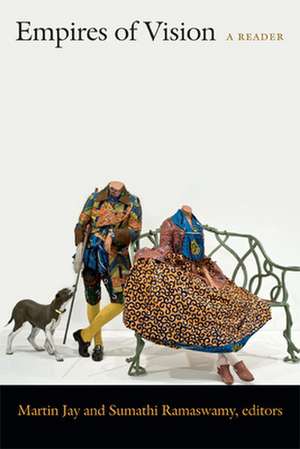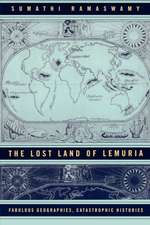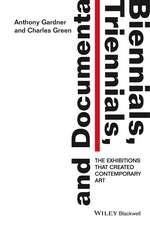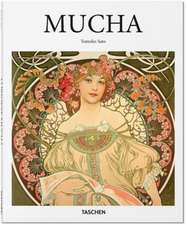Empires of Vision – A Reader: Objects/Histories
Autor Martin Jay, Sumathi Ramaswamyen Limba Engleză Paperback – 13 mar 2014
| Toate formatele și edițiile | Preț | Express |
|---|---|---|
| Paperback (1) | 350.56 lei 6-8 săpt. | |
| MD – Duke University Press – 13 mar 2014 | 350.56 lei 6-8 săpt. | |
| Hardback (1) | 969.96 lei 6-8 săpt. | |
| MD – Duke University Press – 3 apr 2024 | 969.96 lei 6-8 săpt. |
Preț: 350.56 lei
Nou
Puncte Express: 526
Preț estimativ în valută:
67.09€ • 69.78$ • 55.39£
67.09€ • 69.78$ • 55.39£
Carte tipărită la comandă
Livrare economică 14-28 aprilie
Preluare comenzi: 021 569.72.76
Specificații
ISBN-13: 9780822354482
ISBN-10: 0822354489
Pagini: 688
Ilustrații: 58 photographs
Dimensiuni: 155 x 226 x 37 mm
Greutate: 1.04 kg
Editura: MD – Duke University Press
Seria Objects/Histories
ISBN-10: 0822354489
Pagini: 688
Ilustrații: 58 photographs
Dimensiuni: 155 x 226 x 37 mm
Greutate: 1.04 kg
Editura: MD – Duke University Press
Seria Objects/Histories
Recenzii
"Empires of Vision is one of those books that had to be written, and that required, not a single author but an interdisciplinary and cosmopolitan collective of scholarly learning and critical passion. In a brilliant series of interventions, the authors gathered here survey the full range of ways in which imperialism worked its black magic, not just with the standard tools of armies and military technologies, bureaucracies and gunboats, but with photographs, paintings, maps, and the whole range of visual arts and media. This is essential reading for art historians, anthropologists, and scholars of visual culture across the globe."W. J. T. Mitchell, author of Seeing Through Race"The culture of empire has been assessed and analyzed most frequently on the evidence of its "writings." It is the inscriptive archives of law, literature, anthropology, history, theology, amongst others, that have dominated our view of the representational conditions and ideological commitments that prevail in colonial societies. But empire was a potent apparatus for looking, viewing, and gazingan act of surveillance, an art of regulation, and a profound shaper of visual culture. No collaboration could be as fruitful as the shared spirits of Martin Jay and Sumathi Ramaswamy, who serve as our gifted cicerones in the world of empire's seeing. They have gathered together some of the most important essays that explore the visual domain of empire's rule and misrule, and their anthology will have a transformative effect on art history, the history of ideas, and postcolonial studies."Homi K. Bhabha, Anne F. Rothenberg Professor of the Humanities, Harvard University
"Empires of Vision is one of those books that had to be written, and that required, not a single author but an interdisciplinary and cosmopolitan collective of scholarly learning and critical passion. In a brilliant series of interventions, the authors gathered here survey the full range of ways in which imperialism worked its black magic, not just with the standard tools of armies and military technologies, bureaucracies and gunboats, but with photographs, paintings, maps, and the whole range of visual arts and media. This is essential reading for art historians, anthropologists, and scholars of visual culture across the globe." - W. J. T. Mitchell, author of Seeing Through Race "The culture of empire has been assessed and analyzed most frequently on the evidence of its "writings." It is the inscriptive archives of law, literature, anthropology, history, theology, amongst others, that have dominated our view of the representational conditions and ideological commitments that prevail in colonial societies. But empire was a potent apparatus for looking, viewing, and gazing - an act of surveillance, an art of regulation, and a profound shaper of visual culture. No collaboration could be as fruitful as the shared spirits of Martin Jay and Sumathi Ramaswamy, who serve as our gifted cicerones in the world of empire's seeing. They have gathered together some of the most important essays that explore the visual domain of empire's rule and misrule, and their anthology will have a transformative effect on art history, the history of ideas, and postcolonial studies." - Homi K. Bhabha, Anne F. Rothenberg Professor of the Humanities, Harvard University
"Empires of Vision is one of those books that had to be written, and that required, not a single author but an interdisciplinary and cosmopolitan collective of scholarly learning and critical passion. In a brilliant series of interventions, the authors gathered here survey the full range of ways in which imperialism worked its black magic, not just with the standard tools of armies and military technologies, bureaucracies and gunboats, but with photographs, paintings, maps, and the whole range of visual arts and media. This is essential reading for art historians, anthropologists, and scholars of visual culture across the globe." - W. J. T. Mitchell, author of Seeing Through Race "The culture of empire has been assessed and analyzed most frequently on the evidence of its "writings." It is the inscriptive archives of law, literature, anthropology, history, theology, amongst others, that have dominated our view of the representational conditions and ideological commitments that prevail in colonial societies. But empire was a potent apparatus for looking, viewing, and gazing - an act of surveillance, an art of regulation, and a profound shaper of visual culture. No collaboration could be as fruitful as the shared spirits of Martin Jay and Sumathi Ramaswamy, who serve as our gifted cicerones in the world of empire's seeing. They have gathered together some of the most important essays that explore the visual domain of empire's rule and misrule, and their anthology will have a transformative effect on art history, the history of ideas, and postcolonial studies." - Homi K. Bhabha, Anne F. Rothenberg Professor of the Humanities, Harvard University
Notă biografică
Cuprins
Illustrations ix
Reprint Acknowledgments xi
Acknowledgments xv
Introduction: The Work of Vision in the Age of European Empires / Sumathi Ramaswamy 1
Section I: The Imperial Optic
Introduction / Martin Jay and Sumathi Ramaswamy 25
Part 1: Empires of the Palette
1. The Walls of Images / Serge Gruzinski 47
2. Painting as Exploration: Visualizing Nature in Eighteenth-Century Colonial Science / Daniela Bleichmar 64
3. Indian Yellow: Making and Breaking the Imperial Palette / Jordanna Bailkin 91
4. Colonial Panaromania / Roger Benjamin 111
Part 2. The Mass-Printed Imperium
5. Objects of Knowledge: Oceanic Artifacts in European Engravings / Nicholas Thomas 141
6. Excess in the City? Consumption of Imported Prints in Colonial Calcutta, c. 1780¿c. 1795 / Natasha Eaton 159
7. Advertising and the Optics of Colonial Power at the Fin de Siècle / David Ciarlo 189
Part 3. Mapping, Claiming, Reclaiming
8. Mapping Plus Ultra: Cartography, Space, and Hispanic Modernity / Ricardo Padrón 211
9. Mapping an Exotic World: The Global Project of Dutch Cartography, circa 1700 / Benjamin Schmidt 246
10. Visual Regimes of Colonization: European and Aboriginal Seeing in Australia / Terry Smith 267
Part 4. The Imperial Lens
11. The Photography Complex: Exposing Boxer-Era China (1900¿1901), Making Civilization / James L. Hevia 283
12. Colonial Theaters of Proof: Representation and Laughter in the 1930s Rockefeller Foundation Hygeine Cinema in Java / Eric A. Stein 315
13. Colonialism and the Built Space of Cinema / Brian Larkin 346
Section II. Postcolonial Looking
Introduction / Martin Jay and Sumathi Ramaswamy 377
Part 5. Subaltern Seeing: An Overlap of Complexities
14. Speaking Back to Orientalist Discourse / Zeynep Çelik 395
15. Maps, Mother/Goddesses, and Martyrdom in Modern India / Sumathi Ramaswamy 415
16. Notes from the Surface of the Image: Photography, Postcolonialism, and Vernacular Modernism / Christopher Pinney 450
17. "I Am Rendered Speechless by Your Idea of Beauty": The Picturesque in History and Art in the Postcolony / Krista A. Thompson 471
18. Fanon, Algeria, and the Cinema: The Politics of Identification / Robert Stam 503
Part 6. Regarding and Reconstituting Europe
19. Creole Europe: The Reflection of a Reflection / Christopher Pinney 539
20. Picasso, Africa, and the Schemata of Difference / Simon Gikandi 566
21. Double Dutch and the Culture Game / Olu Oguibe 594
Conclusion. A Parting Glance: Empire and Visuality / Martin Jay 609
Contributors 621
Index 629
Reprint Acknowledgments xi
Acknowledgments xv
Introduction: The Work of Vision in the Age of European Empires / Sumathi Ramaswamy 1
Section I: The Imperial Optic
Introduction / Martin Jay and Sumathi Ramaswamy 25
Part 1: Empires of the Palette
1. The Walls of Images / Serge Gruzinski 47
2. Painting as Exploration: Visualizing Nature in Eighteenth-Century Colonial Science / Daniela Bleichmar 64
3. Indian Yellow: Making and Breaking the Imperial Palette / Jordanna Bailkin 91
4. Colonial Panaromania / Roger Benjamin 111
Part 2. The Mass-Printed Imperium
5. Objects of Knowledge: Oceanic Artifacts in European Engravings / Nicholas Thomas 141
6. Excess in the City? Consumption of Imported Prints in Colonial Calcutta, c. 1780¿c. 1795 / Natasha Eaton 159
7. Advertising and the Optics of Colonial Power at the Fin de Siècle / David Ciarlo 189
Part 3. Mapping, Claiming, Reclaiming
8. Mapping Plus Ultra: Cartography, Space, and Hispanic Modernity / Ricardo Padrón 211
9. Mapping an Exotic World: The Global Project of Dutch Cartography, circa 1700 / Benjamin Schmidt 246
10. Visual Regimes of Colonization: European and Aboriginal Seeing in Australia / Terry Smith 267
Part 4. The Imperial Lens
11. The Photography Complex: Exposing Boxer-Era China (1900¿1901), Making Civilization / James L. Hevia 283
12. Colonial Theaters of Proof: Representation and Laughter in the 1930s Rockefeller Foundation Hygeine Cinema in Java / Eric A. Stein 315
13. Colonialism and the Built Space of Cinema / Brian Larkin 346
Section II. Postcolonial Looking
Introduction / Martin Jay and Sumathi Ramaswamy 377
Part 5. Subaltern Seeing: An Overlap of Complexities
14. Speaking Back to Orientalist Discourse / Zeynep Çelik 395
15. Maps, Mother/Goddesses, and Martyrdom in Modern India / Sumathi Ramaswamy 415
16. Notes from the Surface of the Image: Photography, Postcolonialism, and Vernacular Modernism / Christopher Pinney 450
17. "I Am Rendered Speechless by Your Idea of Beauty": The Picturesque in History and Art in the Postcolony / Krista A. Thompson 471
18. Fanon, Algeria, and the Cinema: The Politics of Identification / Robert Stam 503
Part 6. Regarding and Reconstituting Europe
19. Creole Europe: The Reflection of a Reflection / Christopher Pinney 539
20. Picasso, Africa, and the Schemata of Difference / Simon Gikandi 566
21. Double Dutch and the Culture Game / Olu Oguibe 594
Conclusion. A Parting Glance: Empire and Visuality / Martin Jay 609
Contributors 621
Index 629
























